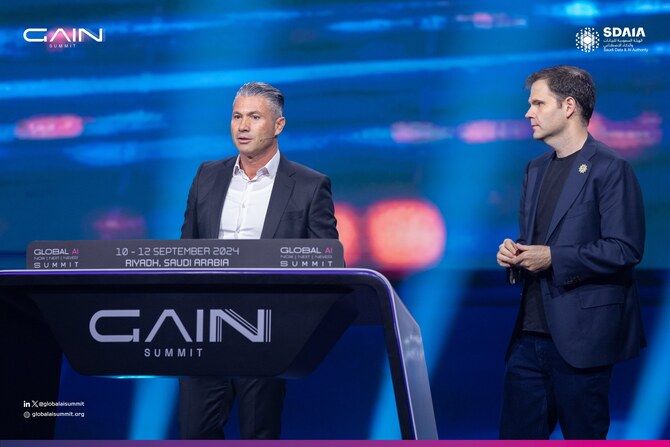RIYADH: A hands-free computer and intent seamlessly translated into action — the future of the workplace is “completely customizable,” Aramco Digital CEO Tareq Amin said on a panel at the Global AI Summit, GAIN, in Riyadh on Tuesday.
In partnership with Groq, the second-largest semiconductor company in artificial intelligence providing advanced AI chips, Aramco Digital unveiled Norous, an advanced generative AI model that uses vocal commands to increase productivity in the workspace.
AI chips process large amounts of data needed for AI workloads.
Take, for example, building an organization structure for a new start-up company; when prompted, Norous will create the structure based on existing models instead of suggesting an answer in a textual format.
Rather than move from application to application, employees will be able to complete all their daily tasks on one smarter platform.
“If you want to be able to establish web conferencing and collaboration, you should be able to declare intent,” Amin said, explaining that commands like “preview weekly calendar” or “schedule meetings” should be made hands-free in order to optimize office efficiency.
Groq will come in to provide the scalable infrastructure needed to bring Norous to life.
Deploying in Saudi Arabia with the commitment to build the world’s largest AI inferencing data center, Jonathan Ross, CEO and founder of Groq, said that the Kingdom is an ideal hub for the project due to its very active business climate, plentiful energy reserves, and strategic location — being “at the nexus of 4 billion people,” Ross said.
Groc claims to make the fastest AI chips in the world, with their language processing unit running at 544 tokens per second. One token is roughly one word.
“Question I get a lot is: Is AI the next internet? The answer is absolutely not, because AI is a generative age technology,” Ross said.
Artificial intelligence is “not about copying or replicating,” he added but rather “about creating something new … and it runs on compute.”
Aramco Digital and Groq plan to deliver 25 million tokens by the end of the first quarter of 2025. With a new supply chain management system capable of generating a billion tokens per second, 20 percent of the 25 million is ready to be deployed this year and the rest is due for the next.
Deployment refers to moving software files from a development space to a production space.
“That’s going to be enough to support neighboring continents that allow us to support parts of Europe, parts of Africa, maybe even a little bit of India,” Ross said.
“When we get to a billion tokens … it’s going to turn the Kingdom into a net exporter of compute that will be able to reach about 4 billion people from this country.”
























